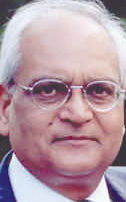The Homefront: Kids find success when adults guide them to it

D. Louise Brown
The sight of a mom squeezing her young son’s arm as he turned away from the sheep he’d just auctioned off was so subtle, but so full of love. Walking around the 4-H Davis County Annual Jr. Livestock Show and Sale last week, I noticed a young boy sitting quietly in a small pen with his beautifully shorn and show-ready sheep. The two creatures stared at each other: one a quiet young animal that had no idea what was about to happen, and the other a quiet young boy who knew this was what he’d raised that sheep for and was ready to take that next step. Their quiet exchange generated an interest in me and I waited for their auction to occur.
Eventually, the young boy appeared on the auction block with his sheep, positioned the animal and hung onto it while the numbers started. The loud, sing-song chant of the auctioneer had already filled the hall as numerous livestock beasts — goats, cattle, hogs and sheep — took their turn at that moment of truth when a price was set on what, until then, had been hard work, careful nurturing and focused development by those young entrepreneurs. Now they were about to learn — in cold, hard dollars — just how valuable their efforts really were.
The sheep on the block raised a respectable amount. As the bidding accelerated, peaked and then slowed, the auctioneer finally sang out “Sold!” and requested the buyer’s bid number, and the buyer called out which butcher the sheep was to be sent to. The young man led his charge off the block, pleased at the price paid for his sheep, and almost perfectly obstructing any other emotions that might be jostling for a place on his face.
But his mom knew.
He’d raised his sheep for just one year yet already knew its nuances, personality and needs enough to provide a fun, short paragraph about the animal that was read by the auctioneer before the bidding began. His mother, on the other hand, had raised her son all his life and she knew a whole lot more about his nuances, personality and needs than he ever did of his sheep. That’s why her hand reached out for that quick squeeze as he walked past her. He looked at her, she smiled a brave smile at him, his chin went up and he was OK.
The event was billed as a livestock show. But the young people were the real show. They were an impressive lot, all exhibiting a similar quiet confidence as they strode about in the fashion of the day — farm boots, blue jeans and crisp, white, button-up shirts sporting the green 4-H symbol. They handled their animals with a familiarity that spoke loads about the amount of time they had spent with their charges. That young woman wouldn’t have been able to steer her large steer if he didn’t already know and trust her. That hog strode amiably around in circles at the careful, prodding staff of his familiar owner. The youngsters moved their animals in and out of the auction arena, posed them perfectly, smiled at the audience and never once broke a sweat. Each of them seemed perfectly capable of the requirements of the day.
Far less obvious, but every bit as essential, were the adults in the room. The limelight shone consistently on the youngsters and their animals. But in layers surrounding the auction arena, a network of adults — leaders, organizers, mentors, friends, buyers and, of course, parents — provided the foundation upon which those young people built their success.
Ironically, I attended the auction to support a young friend who belongs to the 4-H Entrepreneurial Club. Those youngsters were invited to set up vendor booths at the auction. Consequently, I purchased homemade goat’s milk soap, a set of wooden coasters, some 3D-printed earrings, a collection of bracelet charms, a frozen treat, and a snow cone with a side of popcorn, all provided by youngsters whose parents were right beside them, teaching them how to sell items they prepared together in the previous weeks.
I went to the auction to buy some popcorn. I walked away inspired by what I saw: entrepreneurial kids succeeding because their adults supported them. Kids showing up because their adults showed up. Kids growing into adults who will someday guide the next generation. It was a superb portrayal of what it takes for young people to succeed: adults who lead and teach and help them prepare, then stick around for the moment when their animal raises a lot of money — or the moment when their heart cracks a little.
D. Louise Brown lives in Layton. She writes a biweekly column for the Standard-Examiner.



